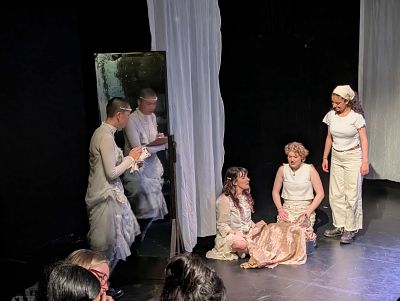
Medusa
Click here if you liked this article 6 ![]()
https://www.melbournefringe.com.au/whats-on/events/medusa
Date Reviewed: 18/10/2025
Climbing the narrow laneway into St Kilda’s Explosives Factory always promises surprise. This time, we enter the Temple of Athena, where white-clad priestesses play and whisper before the lights fade. For a moment, it’s unclear if the show has begun; fitting, since the production aims to blur myth and modernity, ritual and political sermon.
Medusa, written and directed by Bronte Lemaire, reimagines one of mythology’s most misunderstood figures, a woman punished for a god’s desire, transformed from victim to monster. It’s an ambitious idea told through a modern lens.
The show begins with a distinctive Acknowledgment of Country that extends to express solidarity with Palestinians, naming “genocide in Palestine” alongside the dispossession of First Nations people. While well-intentioned, it feels thematically unanchored in a play centred on sexual violence and victim-blaming. The omission of other atrocities involving abduction and sexual assault, such as those of October 7, makes the statement feel uneven. Medusa’s power lies not in geopolitics but in its exploration of betrayal and survival.
Reimagining the myth
Ruby Grinter portrays a Medussa that is both fragile and fierce, though her transformation from priestess to gorgon lacks mythic impact. The choice of a blindfold instead of snakes is symbolically neat but visually flat. Finn Corr’s Poseidon is more aloof than divine, dulling the emotional charge of their encounter.
Stheno, played by Jaimi Sfetcopoulos, is reimagined to add queerness to the story but isn’t fully developed. Described as a "situationship", it aligns with the production's inclusive ethos. There is a lot of politically correctedness added in without truly enhancing the actual storyline.
Still, Lemaire’s script deserves credit for confronting grooming, victim-blaming, and misogyny head-on, exposing how communities turn away from uncomfortable truths.
Warnings, wit, weariness
Before the show, audience members are offered an exhaustive list of content warnings, from sexual assault and violence to strong language and strobe lights. While the concern for audience wellbeing is admirable, the production feels far less confronting than expected. What unfolds has the heart of a passionate student work: earnest, visually inventive, but uneven in tone and pacing.
The mirrored set is a triumph, fragmenting light to reflect Medusa’s fractured psyche. Lighting shifts beautifully between divinity and decay, and the three-metre ox puppet is an unexpected highlight. The cast, especially those playing Athena, Poseidon and Medusa, perform with full commitment, carrying scenes that might otherwise buckle under the script’s ambition.
Lemaire is brave in her attempt to merge ancient tragedy with modern trauma. But by trying to be everything — feminist, mythic, queer, intersectional, activist — the work sometimes loses focus. Still, its heart remains defiant, empathetic, and unafraid to confront the ugliness of victimhood.
Medusa reminds us that theatre, like myth, is a space for risk and experimentation.
Highlights:
- Engagement with difficult themes, such as grooming, victim-blaming, misogyny
- Technically and visually inventive mirrored set design, with great lighting
- 3-metre ox puppet
Who it's for
- Enthusiasts of feminist and intersectional theatre, and those who appreciate theatre as a platform for political sermon
- People willing to overlook narrative inconsistencies and fallacies in ancient myths
- Audiences engaged in contemporary social issues.
Reviewed by Mary Sinanidis